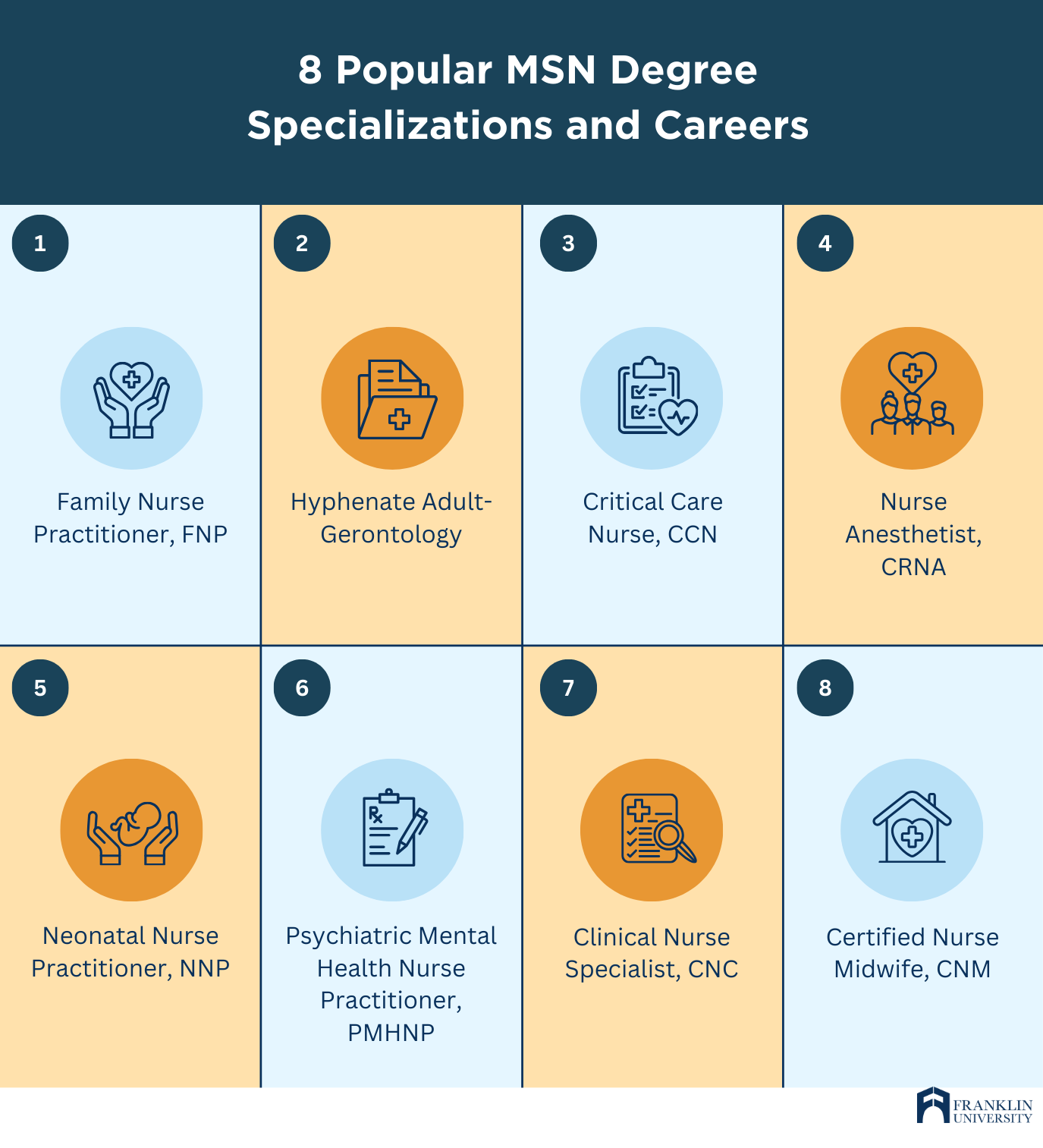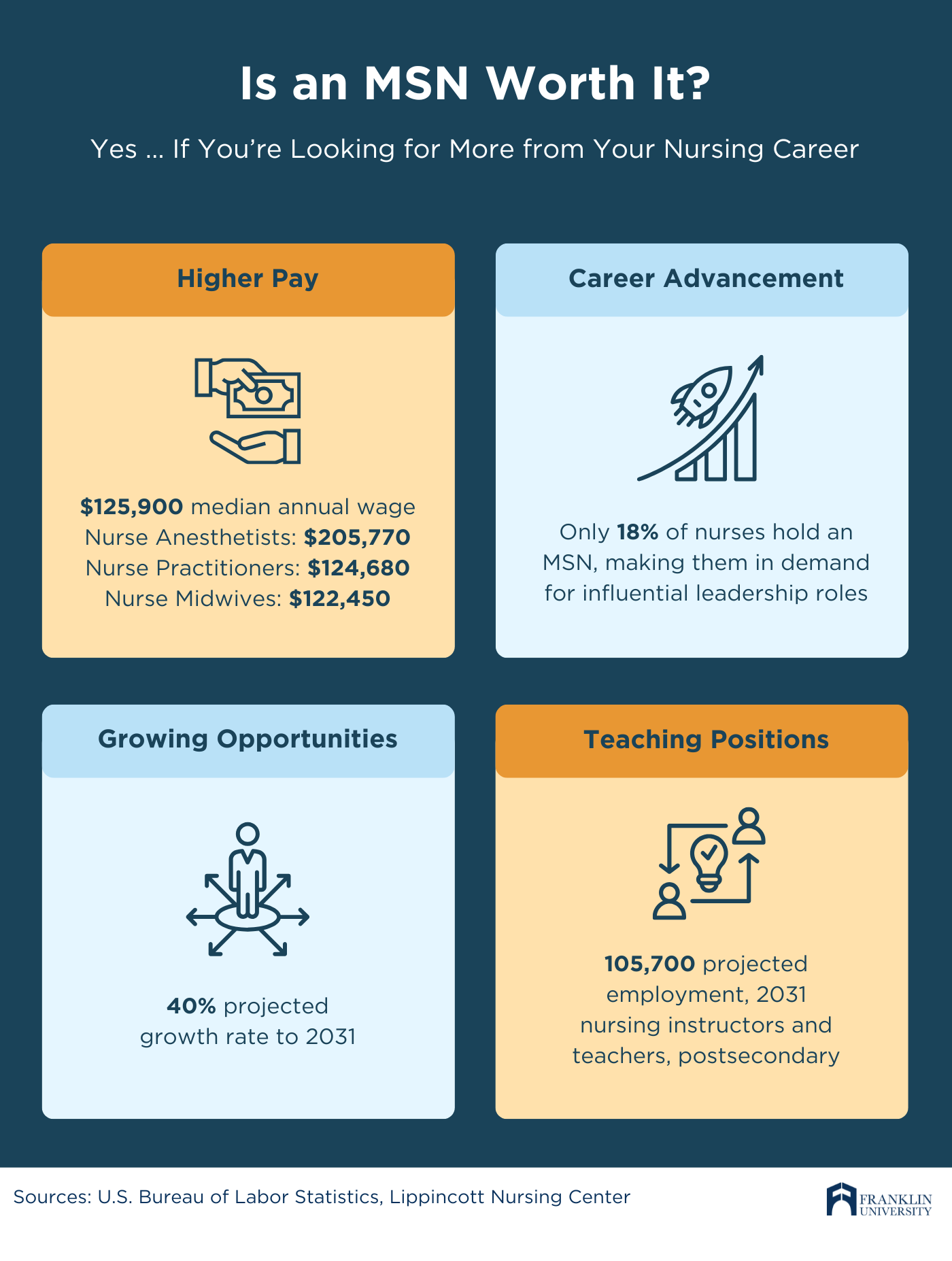Request Information
We're Sorry
There was an unexpected error with the form (your web browser was unable to retrieve some required data from our servers). This kind of error may occur if you have temporarily lost your internet connection. If you're able to verify that your internet connection is stable and the error persists, the Franklin University Help Desk is available to assist you at helpdesk@franklin.edu, 614.947.6682 (local), or 1.866.435.7006 (toll free).
Just a moment while we process your submission.

What is an MSN Degree: Everything You Need to Know
An MSN or Master of Science in Nursing degree is designed to equip professional nurses for advanced roles in healthcare, patient care, patient and policy leadership and nursing education.
And, based on the U.S. Bureau of Labor Statistics (BLS) 40% job growth projection for nurses with master’s degrees, the MSN is going to be more important than ever.
Facts About an M.S. Nursing Degree
What You’ll Learn in an MSN Degree Program
MSN programs are typically pretty rigorous. Generalist, administrator and nurse educator tracks may include 30 to 40 credit hours of coursework along with clinicals, which means they take about two years to finish. Nurse practitioner and other tracks that help you expand your practice area may take up to 41 credit hours along with clinicals, which means it could take a little longer to complete your degree. Ultimately, how long it takes to finish your MSN depends a lot on you, including your academic background and current practice experience.
For the most part, you can expect to take classes related to nurse team supervision, health systems and healthcare ethics. You'll also learn about leading quality improvement initiatives and managing health policies.
Pathways to Entry
1. BSN-to-MSN Program
This degree program is for nurses who’ve already completed their bachelor’s in nursing degree (BSN). So, if you’ve earned a BSN and enjoy your nursing career but want more from it, this is the pathway for you.
2. RN-to-MSN Program
This degree program is for registered nurses who have not earned the BSN credential. So, if you’re a registered nurse looking to take the next step in your nursing career, this pathway to an MSN is for you.
8 Popular MSN Degree Specializations and Careers
According to the BLS, nurse practitioners with a master’s degree, including nurse anesthetists and nurse midwives, have a median annual salary of $123,780. Of course, depending on your location, experience and specialization, you could earn even more.

Get a FREE guide to help you advance your career, featuring helpful advice and thoughtful insights from nursing experts.
Here’s a look at eight of the top MSN degree specializations and the influential, well-paying careers you could get with an MSN.
1. Family Nurse Practitioner
With 70.3% of NPs specializing in family medicine, the MSN-FNP is the most popular of all MSN specialties.
FNPs have many clinical responsibilities and the authority to provide a high level of care, including diagnosing illnesses, determining the proper course of treatment, ordering and interpreting diagnostic tests and imaging, and prescribing medication.
“FNPs are needed in a variety of healthcare settings,” says Debbie Conner, Ph.D., chair of the School of Nursing at Franklin University. “Becoming an FNP opens up your career opportunities within primary care medical offices, clinics and even schools.”
2. Adult Gerontology Primary Care Nurse Practitioner
With 8.9% of NPs specializing in adult-gerontology primary care, the MSN-AGPCNP ranks second among MSN specialties.
Because an AGNP works across a broad patient population from young adult to geriatric, opportunities are many and varied. Specializations and areas of emphasis might include diabetes, health policy, palliative medicine and end-of-life care. No matter what the focus area, however, many AGNPs work in private practice outside of physician supervision.
3. Critical Care Nurse
Critical care nurses are on the front line of caring for the most critically ill patients. Their patients are dealing with traumatic injuries, challenging surgical procedures or life-threatening illnesses. You’ll find critical care nurses working in general intensive care units (ICUs), medical ICUs, surgical ICUs, trauma ICUs, coronary care units, cardiothoracic ICUs, burns units and emergency departments.
Patients in their care often require mechanical ventilation, detailed monitoring, and both confidence and caution in care. Not only does certification for clinical care show knowledge and expertise in intensive care, it also demonstrates a desire for more knowledge and skills to provide the best care for patients whose lives are at stake.
Critical care nurses are in a field of constant learning too. So, they must be familiar and comfortable with technological advances to assist in assessing, monitoring and medicating their patients. Without question, critical care nursing is a high-stress environment, but many nurses are not only drawn to it, they thrive in it.
4. Nurse Anesthetist
A nurse anesthetist may also be called a certified registered nurse anesthetist or CRNA. The role is often an independent one, typically in cases involving local anesthesia. It also may be a role that provides support to an anesthesiologist during surgery or surgery preparation.
“The role of CRNA involves not only anesthesia, but also a deep understanding of pain management,” says Dr. Conner.
According to the American Association of Nurse Anesthetists (AANA), students complete an average of 2,500 clinical hours and administer 850 anesthetics before they earn their certification. It’s a specialization with rigorous academic requirements, with about seven years of higher education and experience to become certified.
5. Neonatal Nurse Practitioner
Healthy newborn babies are put in the care of neonatal nurses. However, it’s the neonatal nurse practitioner (NNP) who cares for newborns in need of urgent or specialized care.
NNPs often manage the care of premature and newborn infants with life-threatening illnesses. They typically work in neonatal ICUs, emergency departments, labor & delivery rooms or specialty clinics. The work is intense, which often means making urgent yet sound decisions.
NNPs also are responsible for assessing patients, diagnosing illnesses and initiating medical procedures.
6. Psychiatric Mental Health Nurse Practitioner
The psychiatric mental health nurse practitioner (PMHNP) has a great deal of independence and demands exceptional decision-making skills. With a growing need for mental healthcare, PMHNPs are becoming more and more in demand.
These specialized NPs can find the greatest career opportunities in mental healthcare facilities, including hospitals, clinics and private practice.
7. Clinical Nurse Specialist
Clinical nurse specialists (CNSs) typically hold at least a master's degree plus certification that recognizes their advanced study, knowledge and clinical skills in a specific area. Their specialization might be related to a particular patient population, such as pediatrics. Or it could be related to an area of nursing, such as diabetes or oncology.
The role of CNS typically involves diagnosing, treating and managing patients; supporting nurses who are caring for patients at the bedside; driving practice changes; and ensuring the implementation of best practices and evidence-based care for improved patient outcomes.
8. Certified Nurse Midwife
Certified midwives (CMs) or certified nurse midwives (CNMs) provide prenatal, gynecological and birth care. They also offer counseling and education for maternity wellness.
“Certification and legal standards vary from state to state,” says Dr. Conner. “So, depending on your state’s requirements, CNMs may work solo or alongside an obstetrician.”
3 Tips to Successfully Start–and Finish–Your MSN
1. Commit to it.
Expect that earning your MSN will require a lot of time and challenging coursework.
“I’ll be honest, it’s a lot to take on,” says Dr. Connor. “So, think ahead. What do you have planned for the next year or two, such as a wedding, a baby or other milestone event. If you can, plan your school work around those events. That way you’ll experience fewer conflicts. Also, let your family, employer and others know that you have commitments that will take some time away from them during this period of time. Finally, practice saying ‘no’ because you simply won’t be able to do it all.”
2. Make a plan.
Planning is essential if you’re going to add the rigors of a master’s degree program to your already busy life. Keep in mind, for example, that the final year of many MSN degree programs require on-site clinical work one or two days a week–which means you’ll need time away from your full-time job. Remember to keep your plan flexible and adjust it over time.
“You’ll get better at planning ahead, scheduling your time and sticking to it,” says Dr. Connor. “Just make sure your family knows about your occasional need to prioritize study and research time. Trust me when I say that your ability to plan ahead in your non-school time will be critical to your educational success.”
3. Ask about tuition assistance.
Investing in your future is just that–and investment. So, there’s nothing wrong with looking for ways to cut tuition costs. Tap into the resources (and pockets) of professional organizations like the American Nurses Association (ANA), Sigma Theta Tau International Honor Society or the American Association of Critical-Care Nurses (AACN). Don’t forget to talk with your employer about tuition reimbursement programs. Many companies have a proud track record of helping employees further their education. And, finally, ask your college or university for their help in finding tuition assistance resources. Some universities offer employer partnership tuition discounts that can save you quite a bit on MSN degree tuition and fees.
Is an MSN Degree Worth It?

An MSN can do a lot of things. It can open up new and different career paths, help you grow in your leadership capacities and further develop your critical-thinking and problem-solving abilities.
So, yes, for many an MSN degree is worth it. Just remember that your journey to a degree will end. And, with the right MSN degree program, you may find the journey not only manageable but enjoyable as well as rewarding.





